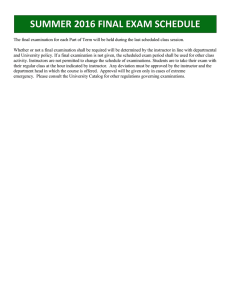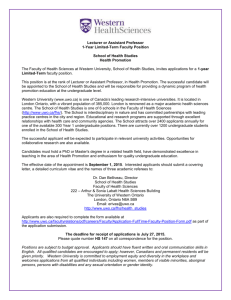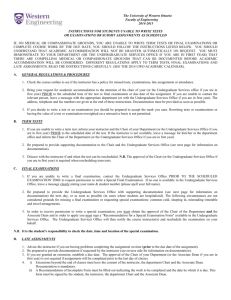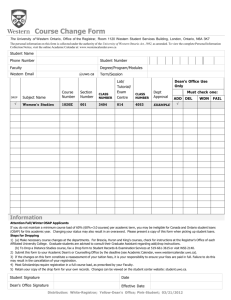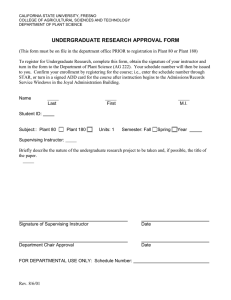ECE 2241b – Electrical Laboratory II
advertisement
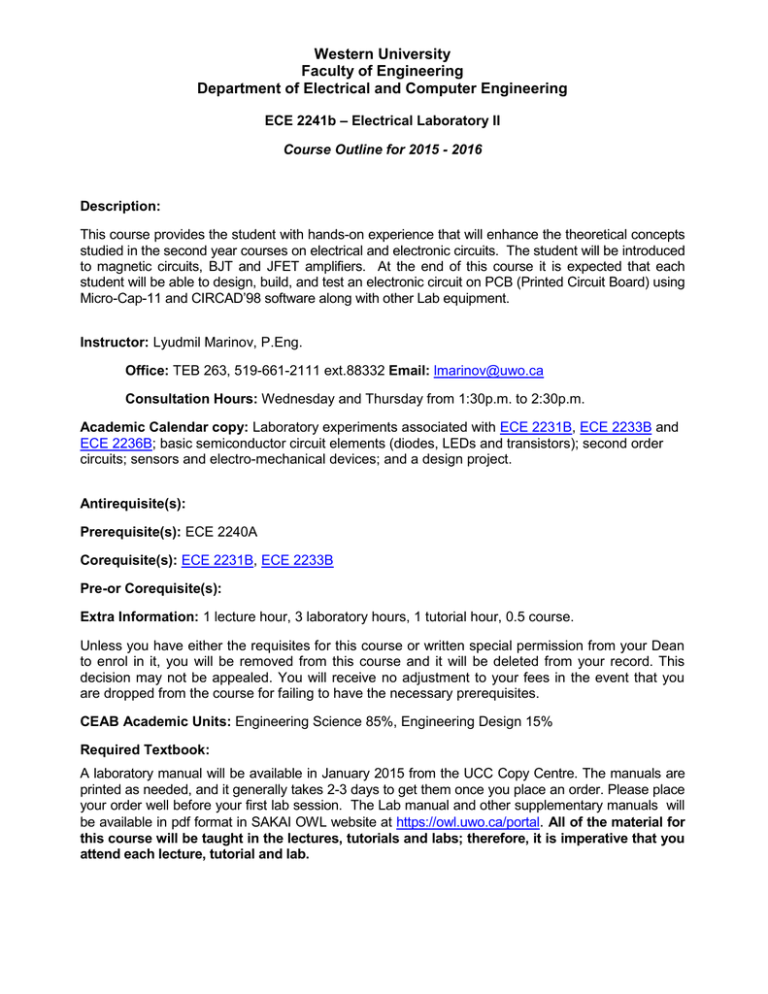
Western University Faculty of Engineering Department of Electrical and Computer Engineering ECE 2241b – Electrical Laboratory II Course Outline for 2015 - 2016 Description: This course provides the student with hands-on experience that will enhance the theoretical concepts studied in the second year courses on electrical and electronic circuits. The student will be introduced to magnetic circuits, BJT and JFET amplifiers. At the end of this course it is expected that each student will be able to design, build, and test an electronic circuit on PCB (Printed Circuit Board) using Micro-Cap-11 and CIRCAD’98 software along with other Lab equipment. Instructor: Lyudmil Marinov, P.Eng. Office: TEB 263, 519-661-2111 ext.88332 Email: lmarinov@uwo.ca Consultation Hours: Wednesday and Thursday from 1:30p.m. to 2:30p.m. Academic Calendar copy: Laboratory experiments associated with ECE 2231B, ECE 2233B and ECE 2236B; basic semiconductor circuit elements (diodes, LEDs and transistors); second order circuits; sensors and electro-mechanical devices; and a design project. Antirequisite(s): Prerequisite(s): ECE 2240A Corequisite(s): ECE 2231B, ECE 2233B Pre-or Corequisite(s): Extra Information: 1 lecture hour, 3 laboratory hours, 1 tutorial hour, 0.5 course. Unless you have either the requisites for this course or written special permission from your Dean to enrol in it, you will be removed from this course and it will be deleted from your record. This decision may not be appealed. You will receive no adjustment to your fees in the event that you are dropped from the course for failing to have the necessary prerequisites. CEAB Academic Units: Engineering Science 85%, Engineering Design 15% Required Textbook: A laboratory manual will be available in January 2015 from the UCC Copy Centre. The manuals are printed as needed, and it generally takes 2-3 days to get them once you place an order. Please place your order well before your first lab session. The Lab manual and other supplementary manuals will be available in pdf format in SAKAI OWL website at https://owl.uwo.ca/portal. All of the material for this course will be taught in the lectures, tutorials and labs; therefore, it is imperative that you attend each lecture, tutorial and lab. Required Software: You should use the Micro-Cap-11 circuit simulation software installed on computers in SEB-1004 and SEB-1012 or download an evaluation copy from: http://www.spectrum-soft.com. You will need to use the software in some of the lab exercises. For PCB design you should use the CirCad98 software installed on computers in SEB-3108 or download a free evaluation copy from: www.holophase.com. Parts Kit: On the first lab session each student will receive a Laboratory Parts Kit containing all components required for the labs. The part kits are provided to students free of charge. Any replacement or additional part kits will be charged according to their nominal value. Other Required References: You may wish to consult the following books to reinforce what is learned in the classroom and lab. 1. Sedra and Smith, Microelectronic Circuits, 6th Edition, Oxford University Press. 2. Boylestad and Nashelsky, Electronic Devices and Circuit Theory, Canadian Edition, Prentice-Hall. 3. Irwin and Nelms, Basic Engineering Circuit Analysis, 9th or 10th Edition. General Learning Objectives (CEAB Graduate Attributes) Knowledge Base 3/1 Engineering Tools Problem Analysis 3/1 Individual & Team Work Investigation Design Communication 3/1 Professionalism 3/1 Impact on Society Ethics and Equity 2/1 Economics and Project Mgmt Life-Long Learning Rating: x/y, where x is the cognitive level (1: Remember, 2: Understand, 3: Apply) at which the attribute is assessed and y is the academic level (1: Beginner, 2: Intermediate, 3: Advanced) at which the attribute is assessed. Topics and Specific Learning Objectives: 1: Magnetic circuits At the end of this section, students will be able to: a. Investigate the magnetic field distribution in a magnetic circuit. b. Measure magnetic field parameters using Gauss meter. 2: Single phase transformers At the end of this section, students will be able to: a. Perform the no-load and short circuit tests on single phase transformer. b. Calculate the transformer’s equivalent circuit parameters. 3: Basic diode applications At the end of this section, students will be able to: a. Learn the basic properties of signal diodes and Zener diodes. b. Understand the operation of a half-wave bridge rectifier, the role of the filter capacitor and how a basic AC/DC power supply works. 4: DC transistor characteristics and biasing At the end of this section, students will be able to: a. Design properly biased BJT transistor circuits. b. Use of a curve tracer to obtain the characteristics of a BJT. c. Build and test BJT circuits 5: BJT switching circuits. At the end of this section, students will be able to: a. Determine quiescent point of a common emitter BJT switch and calculate the values of the resistors b. Design and test Boolean logic gate circuits. c. Design and test a light sensitive BJT switch. 6: Study the characteristics and operation of basics BJT amplifier. At the end of this section, students will be able to: a. Determine quiescent point of a common emitter and common collector amplifiers and calculate the DC biasing resistors values. b. Simulate and measure CE and CC amplifier gain and Phase frequency response using Bode Plots. 7: Study the characteristics and operation of JFET amplifier. At the end of this section, students will be able to: a. Determine quiescent point of a common source (CS) and common drain (CD) amplifiers and calculate the DC biasing resistors values. b. Simulate and measure CS and CD amplifier gain and phase frequency response using Bode plots. 8: Study the small and large signal performance of the BJT amplifier. At the end of this section, students will be able to: a. Vary the quiescent point of a common emitter b. Observe small signal performance of CE BJT amplifier for different biasing regimes. c. Observe large signal performance and load characteristics of CE BJT amplifier. 9: Project - design an electrical circuit by given parameters, design a Printed Circuit Board using CirCad software, solder and test the device, write a formal Report. At the end of this section, students will be able to: a. Design and calculate component values of an electrical circuit, simulate it in MicroCap and verify the design. Build the circuit on the breadboard and measure it’s parameters. b. Design a Printed Circuit Board using CirCad software, solder components and test the designed c. Write a formal Project report Evaluation: Course Component Weight Laboratory 45% Project 15% Final Examination 40% To obtain a passing grade in the course the student is required to achieve: 1. A minimum mark of 50% in each laboratory exercise, with a minimum average of 60% across all laboratory exercises. 2. A minimum of 50% on the project 3. A minimum of 50% on the final exam. Laboratory: Eight laboratory experiments containing pre-lab, demonstrations to the TA and a lab report due at the end of each lab. No late lab report submission is allowed. Project: Each student is required to design, build and test an electrical circuit on a breadboard, design a PC board, solder, test and demonstrate a finished device and write a formal report. The details of the project will be distributed in class. The project is done during two lab periods and the project report is due at the end of the second lab session. No late lab report submission is allowed. Final Examination: The final examination will be two and ½ hours long, closed book, nonprogrammable calculators allowed. Use of English Policy: In accordance with Senate and Faculty Policy, students may be penalized up to 10% of the marks on all assignments, tests, and examinations for improper use of English. Additionally, poorly written work with the exception of the final examination may be returned without grading. If resubmission of the work is permitted, it may be graded with marks deducted for poor English and/or late submission. Attendance Policy: All classes, laboratories, and tutorials are mandatory unless otherwise stated and the attendance will be taken. Any student who, in the opinion of the instructor, is absent too frequently from class, laboratory, or tutorial periods will be reported to the Dean (after due warning has been given). On the recommendation of the department, and with the permission of the Dean, the student will be debarred from taking the regular final examination in the course. Absence Due to Illness or Other Circumstances: Students should immediately consult with the instructor or department Chair if they have any problems that could affect their performance in the course. Where appropriate, the problems should be documented (see the attached “Instructions for Students Unable to Write Tests or Examinations or Submit Assignments as Scheduled”). The student should seek advice from the instructor or department Chair regarding how best to deal with the problem. Failure to notify the instructor or department Chair immediately (or as soon as possible thereafter) will have a negative effect on any appeal. You will only be allowed to make up for a missed laboratory if you have a valid excuse (e.g., doctor’s note). For more information concerning medical accommodations, see the relevant section of the Academic Handbook: http://www.uwo.ca/univsec/pdf/academic_policies/appeals/accommodation_medical.pdf For more information concerning accommodations for religious holidays, see the relevant section of the Academic Handbook: http://www.uwo.ca/univsec/pdf/academic_policies/appeals/accommodation_religious.pdf Cheating and Plagiarism: Students must write their essays and assignments in their own words. Whenever students take an idea or a passage from another author, they must acknowledge their debt both by using quotation marks where appropriate and by proper referencing such as footnotes or citations. University policy states that cheating, including plagiarism, is a scholastic offence. The commission of a scholastic offence is attended by academic penalties, which might include expulsion from the program. If you are caught cheating, there will be no second warning. All required papers may be subject to submission for textual similarity review to commercial plagiarism-detection software under license to the University for the detection of plagiarism. All papers submitted will be included as source documents on the reference database for the purpose of detecting plagiarism of papers subsequently submitted to the system. Use of the service is subject to the licensing agreement, currently between the University of Western Ontario and Turnitin.com (http://www.turnitin.com). Scholastic offences are taken seriously and students are directed to read the appropriate policy, specifically, the definition of what constitutes a Scholastic Offence, in the relevant section of the Academic Handbook: http://www.uwo.ca/univsec/pdf/academic_policies/appeals/scholastic_discipline_undergrad.pdf Use of Electronic Devices: Students may use laptops, tablet computers, or smart phones only to access the course OWL site during lectures and tutorials. Use of nonprogrammable calculators only is permitted during quizzes and examinations. No other electronic devices may be used at any time during lectures, tutorials, or examinations. Policy on Repeating All Components of a Course: Students who are required to repeat an Engineering course must repeat all components of the course. No special permissions will be granted enabling a student to retain laboratory, assignment, or test marks from previous years. Previously completed assignments and laboratories cannot be resubmitted by the student for grading in subsequent years. Internet and Electronic Mail: Students are responsible for regularly checking their Western e-mail and the course web site (https://owl.uwo.ca/portal/) and making themselves aware of any information that is posted about the course. Accessibility: Please contact the course instructor if you require material in an alternate format or if any other arrangements can make this course more accessible to you. You may also wish to contact Services for Students with Disabilities (SSD) at 519-661-2111 ext. 82147 for any specific question regarding an accommodation. Support Services: Office of the Registrar, http://www.registrar.uwo.ca/ Student Devlopment Centre, http://www.sdc.uwo.ca/ Engineering Undergraduate Services, http://www.eng.uwo.ca/undergraduate/ USC Student Support Services, http://westernusc.ca/services/ Students who are in emotional/mental distress should refer to Mental Health @ Western, http://www.health.uwo.ca/mental_health/, for a complete list of options about how to obtain help. Western University - Faculty of Engineering 2015-2016 INSTRUCTIONS FOR STUDENTS UNABLE TO WRITE TESTS OR EXAMINATIONS OR SUBMIT ASSIGNMENTS AS SCHEDULED IF, ON MEDICAL OR COMPASSIONATE GROUNDS, YOU ARE UNABLE TO WRITE TERM TESTS OR FINAL EXAMINATIONS OR COMPLETE COURSE WORK BY THE DUE DATE, YOU SHOULD FOLLOW THE INSTRUCTIONS LISTED BELOW. YOU SHOULD UNDERSTAND THAT ACADEMIC ACCOMMODATION WILL NOT BE GRANTED AUTOMATICALLY ON REQUEST. YOU MUST DEMONSTRATE TO YOUR DEPARTMENT (OR THE UNDERGRADUATE SERVICES OFFICE) THAT THERE ARE COMPELLING MEDICAL OR COMPASSIONATE GROUNDS THAT CAN BE DOCUMENTED BEFORE ACADEMIC ACCOMMODATION WILL BE CONSIDERED. DIFFERENT REGULATIONS APPLY TO TERM TESTS, FINAL EXAMINATIONS AND LATE ASSIGNMENTS. READ THE INSTRUCTIONS CAREFULLY. (SEE THE 2015 UWO ACADEMIC CALENDAR). A. B. C. GENERAL REGULATIONS & PROCEDURES 1. All first year students will report to the Undergraduate Services Office, SEB 2097, for all instances. 2. If you are an upper year student and you are missing a test/assignment/lab or exam that is worth MORE THAN 10% of your final grade, you will report to the Undergraduate Services Office, SEB 2097. Otherwise, you will report to your department office to request accommodation. 3. Check the course outline to see if the instructor has a policy for missed tests, examinations, late assignments or attendance. 4. Documentation must be provided as soon as possible. If no one is available in your Department office or the Undergraduate Services Office, leave a message clearly stating your name & student number and reason for your call. The department telephone numbers are given at the end of these instructions. 5. If you decide to write a test or an examination you should be prepared to accept the mark you earn. Rewriting tests or examinations or having the value of a test or examination reweighted on a retroactive basis is not permitted. TERM TESTS 1. If you are in first year and you are unable to write a term test, contact the Undergraduate Services Office, SEB 2097 PRIOR to the scheduled date of the test. 2. If you are an upper year student and you are unable to write a term test, inform your instructor PRIOR to the scheduled date of the test. If the instructor is not available, leave a message for him/her at the department office. If the test is worth MORE THAN 10% of your final grade you will report to the Undergraduate Services Office, SEB 2097 to request accommodation. Otherwise, you will report to your department office to request accommodation. 3. Be prepared to provide supporting documentation to the Department Chair and/or the Undergraduate Services Office (see next page for information on documentation). 4. Discuss with the instructor if and when the test can be rescheduled. N.B. The approval of the Chair or the Undergraduate Services Office is required when rescheduling term tests. FINAL EXAMINATIONS 1. If you are unable to write a final examination, contact the Undergraduate Services Office PRIOR TO THE SCHEDULED EXAMINATION TIME to request permission to write a Special Final Examination. If no one is available in the Undergraduate Services Office, leave a message clearly stating your name & student number. 2. Be prepared to provide the Undergraduate Services Office with supporting documentation (see next page for information on documentation) the next day, or as soon as possible (in cases where students are hospitalized). The following circumstances are not considered grounds for missing a final examination or requesting special examinations: common cold, sleeping in, misreading timetable and travel arrangements. 3. In order to receive permission to write a special examination, you must obtain the approval of the Chair of the Department and the Associate Dean and in order to apply you must sign a "Recommendation for a Special Examination Form" available in the Undergraduate Services Office. The Undergraduate Services Office will then notify the course instructor(s) and reschedule the examination on your behalf. N.B. It is the student's responsibility to check the date, time and location of the special examination. D. LATE ASSIGNMENTS 1. Advise the instructor if you are having problems completing the assignment on time (prior to the due date of the assignment). 2. Be prepared to provide documentation if requested by the instructor (see reverse side for information on documentation). 3. If you are granted an extension, establish a due date. The approval of the Chair of your Department (or the Associate Dean if you are in first year) is not required if assignments will be completed prior to the last day of classes. 4. i) Extensions beyond the end of classes must have the consent of the instructor, the department Chair and the Associate Dean. Documentation is mandatory. ii) A Recommendation of Incomplete Form must be filled out indicating the work to be completed and the date by which it is due. This form must be signed by the student, the instructor, the department Chair and the Associate Dean. E. SHORT ABSENCES If you miss a class due to a minor illness or other problems, check your course outlines for information regarding attendance requirements and make sure you are not missing a test or assignment. Cover any readings and arrange to borrow notes from a classmate. F. EXTENDED ABSENCES If you are absent more than one week or if you get too far behind to catch up, you should consider reducing your workload by dropping one or more courses. (Note drop deadlines listed below). You may want to seek advice from the academic counsellor in your Department or Ms. Karen Murray in the Undergraduate Services Office, if you are in first year. G. DOCUMENTATION If you consulted an off-campus doctor or Student Health Services regarding your illness or personal problem, you must provide the doctor with a Student Medical Certificate to complete at the time of your visit and then bring it to the Department (or the Undergraduate Services Office). This note must contain the following information: severity of illness, effect on academic studies and duration of absence. Regular doctors notes will not be accepted; only the Student Medical Certificate will be accepted. In Case of Serious Illness of a Family Member: Provide a Student Medical Certificate to your family member's physician to complete and bring it to the Department (or the Undergraduate Services Office if you are in first year). In Case of a Death: Obtain a copy of the death certificate or the notice provided by the funeral director's office. You must include your relationship to the deceased and bring it to the Department (or the Undergraduate Services Office if you are in first year). For Other Extenuating Circumstances: If you are not sure what documentation to provide, ask the Departmental Office (or the Undergraduate Services Office if you are in first year) for direction. Note: Forged notes and certificates will be dealt with severely. To submit a forged document is a scholastic offence (see below). H. ACADEMIC CONCERNS 1. You need to know if your instructors have a policy on late penalties, missed tests, etc. This information may be included on the course outlines. If not, ask your instructor(s). 2. You should also be aware of attendance requirements in some courses. You can be debarred from writing the final examination if your attendance is not satisfactory. 3. If you are in academic difficulty, check out the minimum requirements for progression in the calendar. If in doubt, see your academic counsellor. Calendar References: Check these regulations in your 2015 Western Academic Calendar available at www.westerncalendar.uwo.ca. Absences Due to Illness: http://www.westerncalendar.uwo.ca/2015/pg117.html Academic Accommodations for Students with Disabilities: http://www.westerncalendar.uwo.ca/2015/pg118.html Academic Accommodations for Religious or Holy Days: http://www.westerncalendar.uwo.ca/2015/pg118.html Course Withdrawals: http://www.westerncalendar.uwo.ca/2015/pg157.html Examinations: http://www.westerncalendar.uwo.ca/2015/pg129.html Scheduling of Term Assignments: http://www.westerncalendar.uwo.ca/2015/pg97.html Scholastic Offences: http://www.westerncalendar.uwo.ca/2015/pg113.html Student Medical Certificate: http://www.uwo.ca/univsec/pdf/academic_policies/appeals/medicalform.pdf Engineering Academic Regulations: http://www.westerncalendar.uwo.ca/2015/pg1442.html Note: These instructions apply to all students registered in the Faculty of Engineering regardless of whether the courses are offered by the Faculty of Engineering or other faculties in the University. Drop Deadlines: First term half course (i.e. “A” or “F”): Full courses and full-year half courses (i.e. “E”,“Y” or no suffix): Second term half or second term full course (i.e. “B” or “G”): November 5, 2015 November 30, 2015 March 7, 2016 Contact Information: Undergraduate Services Office: Dept. of Chemical and Biochemical Engineering & Green Process Engineering: Dept. of Civil and Environmental Engineering: Dept. of Electrical and Computer Engineering, Software Engineering & Mechatronics Engineering: Dept. of Mechanical and Materials Engineering: SEB 2097 TEB 477 SEB 3005 Telephone: (519) 661-2130 Telephone: (519) 661-2131 Telephone: (519) 661-2139 Fax: (519) 661-3757 Fax: (519) 661-3498 Fax: (519) 661-3779 TEB 279 SEB 3002 Telephone: (519) 661-3758 Telephone: (519) 661-4422 Fax: (519) 850-2436 Fax: (519) 661-3020 Revised 08/05/15

